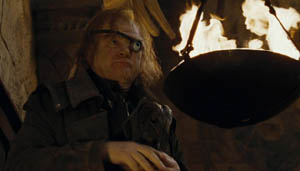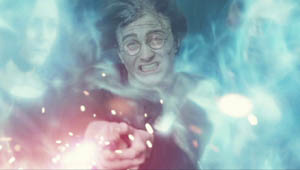|
Bing! This film does not open with Harry being again treated like human waste by his aunt and uncle! Unbing! It does feature a character exclaiming "So you're Harry Potter!" within the first five or so minutes. Win some, lose some. That's sort of the feel of this whole movie, in more ways than one. Attending the Quidditch World Cup event with his friends, Harry is lost amongst the ruins when the proceedings are unexpectedly attacked. The assailants are servants of perennial baddy Lord Voldemort, known as Death Eaters, a moniker seemingly picked for its malevolent sound rather than logic (we all eat dead things in one way or another; wouldn't "Life Eater" actually be much worse in meaning?). Awakening in the aftermath, Harry sees a mysterious man place the mark of Voldemort in the skies above. It's a bad omen, and coupled with Harry's recent dreams of Voldemort consorting with his followers, it looks to be that most unexpected of things: a year when it will be unsafe at Hogwarts. 
In order to foster greater cooperation in the wizarding world, Hogwarts' headmaster Dumbledore has agreed to host the Triwizard Tournament, where three schools will compete in a triathalon of events so dangerous to competitors and bystanders alike that it can only be assumed that admission to Hogwarts must be accompanied by a fifty-page waiver that must be signed in blood. Despite a moratorium on applicants under the age of seventeen, Harry's name ends up submitted to and accepted by the mystical Goblet of Fire, an acceptance which, according to those sorts of rules designed to ensure that the plot can go forward, cannot be declined afterwards. Harry denies putting his name in the goblet, and we pretty much believe him. No one at Hogwarts is so certain. Dumbledore reacts with a mixture of fury and panic, as if confronted with a son who has just lied about his age to gain admission to the Marines during wartime. Ron is angry and resentful that his best friend is seemingly keeping secrets. The student body at large derides Harry as a cheater, an unusual reaction given that they applauded the Weasley brothers' very public (and failed) attempt to also cheat the age rule. Kids are strange creatures. They aren't the only ones, however. Harry's fourth year sees the arrival of several new faces, chiefly the wildly eccentric Professor Moody. As Moody is the new Defense Against the Dark Arts teacher, one cannot help, if one has seen the previous triad of films, instantly being suspicious. (Why never the new math teacher? I mean, these kids have to learn that shit too, right?) My first reaction was wondering where I'd seen this actor before (nowhere, apparently), and my second was instantly wanting to see more of him. He gives a truly great performance, creating a character at once unnerving and yet with an odd charm, a man who has been through horrors and still has his sense of humor, albeit one perhaps only he finds humorous. Additionally, we meet Barty Crouch, one of the tournament judges who once sent his own son to Azkaban prison for being a Death Eater, and Igor Karkaroff, headmaster of one of the other competing schools and a former Death Eater himself, according to the dire warnings of Harry's godfather. Most of this has precious little to do with the contest that forms the clear centerpiece of the story, and one gets the impression that most of the important, long-term developments are happening behind the scenes-perhaps far behind them. Novelist J. K. Rowling seems to have created a dense, multi-layered narrative with these stories. I say "seems," because I've never read the books, and because the films are beginning to feel like Cliff notes for longer works. Important details blow past as if in a gale force wind while the broad strokes of the wizarding tournament fill most of the running time (for some reason, the contest seems to take up the whole school year, despite having a mere three events). What sounds to be an important revelation regarding Professor Snape, for example, is a detail that a good blink could render invisible. One of Voldemort's servants is named as "Wormtail," whereas in the last film he was "Peter Pettigrew." The filmmakers appear content to assume the viewer has previously read the book and doesn't need this explained. Because of this, and the ever-lengthening source novels, I forsee trouble for upcoming films in the series. With more and more characters and relationships being introduced in each new chapter, will the audience who only knows the world of Harry Potter via the movie versions have any clue what is happening by the time the end is reached? 
Goblet of Fire walks a line between what is entertaining for this film unto itself and what is good for the series as a whole, and errs a bit on the side of caution; the plot proper doesn't really arrive until almost the very end. In the broader context, the rest is largely killing time, though in the noble pursuit of fleshing out the characters. While not plot-centric by any means, the Yule Ball is one of the film's most entertaining sequences. The principals are teenagers now, which the film acknowledges with glee; indeed, Ron's comment regarding the visiting girls' school students, "You know I like it when they walk," is probably the best bit of dialogue in the film. The tone has matured with the characters, and gone are the days when one could exit one of these films feeling that everything had been put right. But the slickly-oiled mechanism and overall cleverness of Prisoner of Azkaban is diminished here, and the film's big last-act twist feels somewhat recycled. If the filmmakers don't want to significantly lengthen future installments, they're going to have to become rather masterful at making scenes multi-task in information dispensing, or else run the risk of piling unweildy narrative debts on future films. We want to care what happens to everyone in the end, but we'd quite like to be able to follow why it happens, as well. -review by Matt Murray
|
|
||||||||